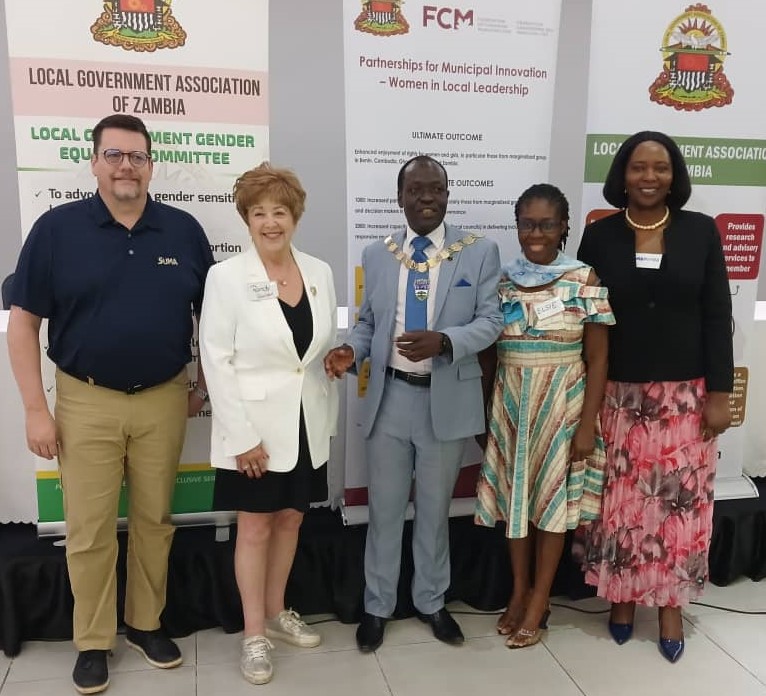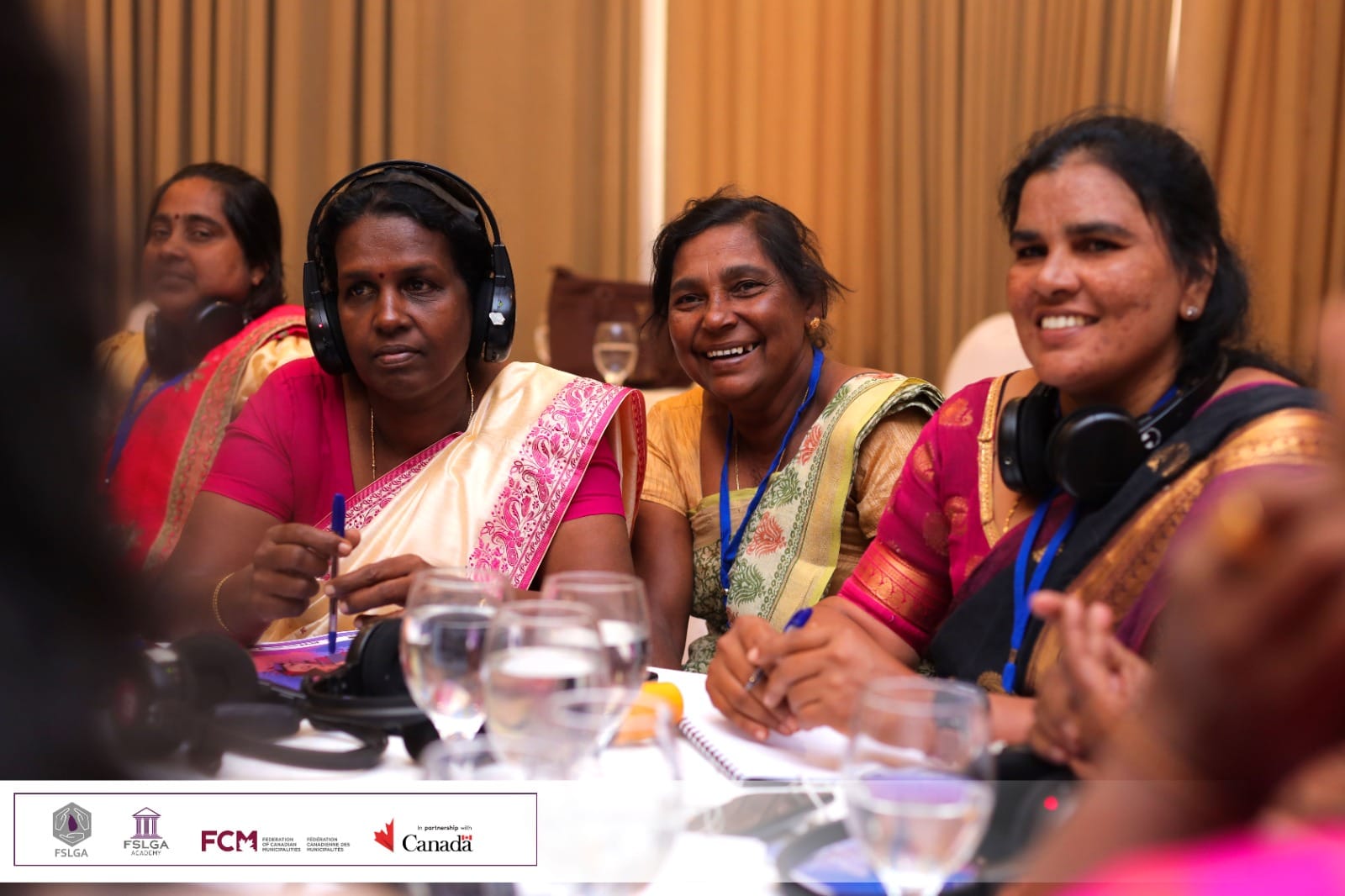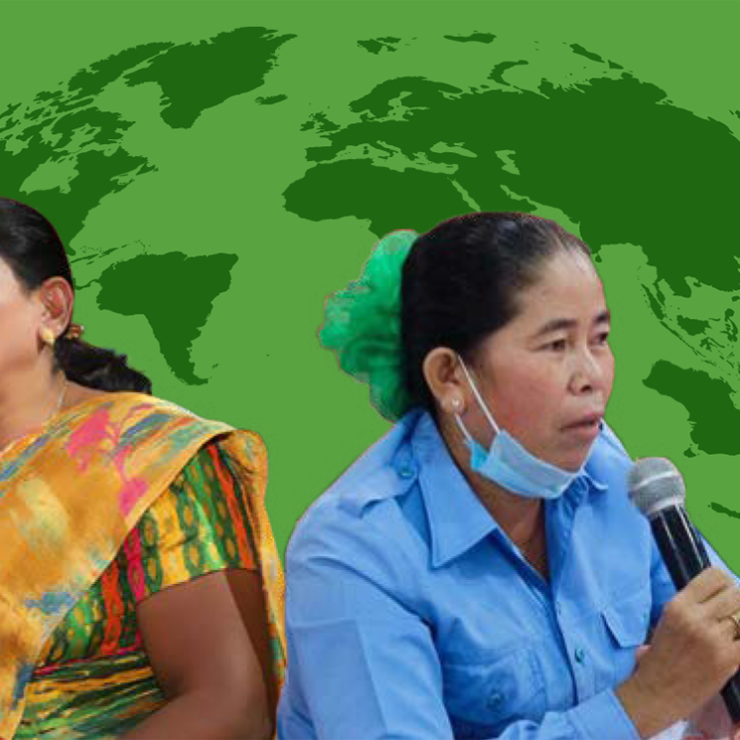Knowledge Sharing and Exchange Experience
 Capitalizing on FCM’s Canadian constituency of municipal experts, the project promotes the integration of women in local leadership through a series of webinars, training, exchanges, networking and subject/country specific resources. Supported by PMI-WILL, the Gender Hub is a platform for collaboration and an online repository for information, strategies, best practices and case studies.
Capitalizing on FCM’s Canadian constituency of municipal experts, the project promotes the integration of women in local leadership through a series of webinars, training, exchanges, networking and subject/country specific resources. Supported by PMI-WILL, the Gender Hub is a platform for collaboration and an online repository for information, strategies, best practices and case studies.
Webinars
In August 2023, a virtual gathering of trailblazers, change makers and gender equality advocates assembled to share their journeys of women’s empowerment. Distinguished elected women from PMI-WILL project countries shared stories, highlighted achievements and provided their perspective on effective strategies for success for women in local politics. In October 2023, a second set of webinars expanded participation, including thought leaders and practitioners. The first webinar explored best practices for inclusive and gender sensitive municipal service delivery. A Canadian environmental scan presented fifty innovations from more than forty municipalities to colleagues from the global south. The second webinar consolidated project research findings around challenges to women’s participation as local government politicians and senior administrators. A comprehensive analysis covered barriers: political and legal; social-cultural and religious; institutional; and individual. Over 150 participants explored strategies to support women’s meaningful participation in local governance. This was the first webinar hosted by the CIB Gender Hub.
Regional and Global Networking
 In November 2023, the 9th United Cities and Local Governments Asia Pacific (UCLG ASPAC) Congress highlighted “Women Trailblazers and Innovators in Local Governance”, including active participation of women in decision-making and securing government support to promote women’s leadership. PMI-WILL showcased research findings through a poster display and speakers including our partners Federation of Sri Lanka Local Government Authorities (FSLGA) and National League of Local Councils of Cambodia (NLC). PMI-WILL outlined ongoing struggles women face in assuming leadership positions. Globally women hold 35% of seats in local government, a 4% increase since 2015.
In November 2023, the 9th United Cities and Local Governments Asia Pacific (UCLG ASPAC) Congress highlighted “Women Trailblazers and Innovators in Local Governance”, including active participation of women in decision-making and securing government support to promote women’s leadership. PMI-WILL showcased research findings through a poster display and speakers including our partners Federation of Sri Lanka Local Government Authorities (FSLGA) and National League of Local Councils of Cambodia (NLC). PMI-WILL outlined ongoing struggles women face in assuming leadership positions. Globally women hold 35% of seats in local government, a 4% increase since 2015.
PMI-WILL partners shared project experiences at the Commonwealth Local Government Conference 2023 (CLGC) held in Rwanda, including leading a working group on gender equality for resilient local communities. The panel included the CEO from FSLGA and women elected officials from Zambia and Ghana. PMI-WILL participants shared their experiences and lessons learned and fed into CLGF Commonwealth Local Government Forum’s program and the Commonwealth dialogue on sustainable development.
International Experience Sharing
Canadian municipal experts (64 women / 17 men) shared experiences with peers in project country including women local elected officials, local governments and local government associations. They provided training to support integrating gender inclusive concepts, addressing needs of marginalized constituents and identifying required service improvements. The collaboration led to the production of a strategic plan and communication strategy in two countries. Additionally, the women’s networks in Benin and Sri Lanka identified key advocacy issues and training needs.
A Cambodia delegation from NLC travelled to Canada in October 2023 to work with the Union of BC Municipalities’ experts on economic development, financial sustainability, communications and advocacy. The Canadians and Cambodians explored commonalities in service delivery, resulting in an engaging exchange and a commitment to ongoing dialogue.
Discover PMI-WILL's first Impact Report
 We are pleased to share the first PMI-WILL Impact Report, which documents how the program is transforming the communities and people where it works. The report showcases the progress achieved in the first two years of implementation, in particular how it is enhancing women's role in local government and inclusivity of municipal services. Through dynamic capacity building and networking initiatives which engaged our Canadian municipal partners, the project has reached a diverse group of more than 2000 women. Notably, 26% of participants hailed from marginalized groups, underlining our commitment to equity and inclusion. More specifically, PMI-WILL contributed to:
We are pleased to share the first PMI-WILL Impact Report, which documents how the program is transforming the communities and people where it works. The report showcases the progress achieved in the first two years of implementation, in particular how it is enhancing women's role in local government and inclusivity of municipal services. Through dynamic capacity building and networking initiatives which engaged our Canadian municipal partners, the project has reached a diverse group of more than 2000 women. Notably, 26% of participants hailed from marginalized groups, underlining our commitment to equity and inclusion. More specifically, PMI-WILL contributed to:
Empowering Women in Local Governance: By providing capacity building and networking activities, and by uplifting women's participation and leadership in local governance. The report provides examples of women candidates who received training and support, paving the way for greater representation and participation in local elections.
Policy Changes for Greater Inclusion: PMI-WILL advocated for policy changes to ensure a more inclusive and gender-responsive approach in local governments. Read how policy shifts made a tangible difference.
Inclusive Municipal Services: By supporting efforts and collaboration to foster gender-responsive municipal services, which benefits the entire community. Learn about innovative approaches that promoted inclusivity.
Global Collaboration: PMI-WILL promotes and supports international collaboration to drive positive change. Discover how peers coming together made a global impact.
The full report is available here.
Why PMI-WILL?
Local governments are responsible for a wide range of services that are essential to people’s daily lives. Many of the services deemed local in nature (sanitation, water provision, primary education, community health services, local transportation) impact women and girls the most. Local governments play a key role in ensuring equitable access to those services.
But municipal plans and services, such as infrastructure and security, often do not take patterns of women's movement and places of work into consideration, exposing them to increased risks to their health and safety, including gender-based violence.
Working to achieve gender parity on municipal counciIs and developing inclusive processes to assess citizens’ needs are proven measures that FCM has implemented in various settings and locations to tackle socio-economic disparities, help redress democratic deficits and improve gender equality. Along with our Canadian municipal experts, we are applying this peer-to-peer approach with partners in five countries in Africa and Asia.
The Partnerships for Municipal Innovation – Women in Local Leadership (PMI-WILL) is a six-year project (2021-2027) that is part of FCM’s portfolio of gender equality and women in local government initiatives. It is implemented in five countries: Benin, Cambodia, Ghana, Sri Lanka and Zambia.
The project is funded by Global Affairs Canada. It helps to achieve the goals of Canada's Feminist International Assistance Policy (FIAP) by assisting “governments of developing countries to improve their ability to deliver programs that support gender equality at all levels of government and in all sectors.” By “supporting civic participation among groups disproportionately affected by poverty” it is also aligned with Canada’s Official Development Assistance Accountability Act (ODAAA).
PMI-WILL aims to achieve two core objectives:
- Increasing women’s capacity to get involved and lead in local governance
- Increasing local governments' capacity to deliver inclusive, gender-responsive services
PMI-WILL is implemented in partnership with FCM’s member municipalities, provincial and territorial associations (PTAs), as well as in collaboration with Local Government Associations (LGAs) and key stakeholders in each of the five implementation countries. It is funded by the federal government through Global Affairs Canada.
We thank all the elected officials, the municipalities and the Provincial and Territorial Associations involved in the project for their ongoing support.




 Capitalizing on FCM’s Canadian constituency of municipal experts, the project promotes the integration of women in local leadership through a series of webinars, training, exchanges, networking and subject/country specific resources. Supported by PMI-WILL, the
Capitalizing on FCM’s Canadian constituency of municipal experts, the project promotes the integration of women in local leadership through a series of webinars, training, exchanges, networking and subject/country specific resources. Supported by PMI-WILL, the  In November 2023, the 9th United Cities and Local Governments Asia Pacific (UCLG ASPAC) Congress highlighted “Women Trailblazers and Innovators in Local Governance”, including active participation of women in decision-making and securing government support to promote women’s leadership. PMI-WILL showcased
In November 2023, the 9th United Cities and Local Governments Asia Pacific (UCLG ASPAC) Congress highlighted “Women Trailblazers and Innovators in Local Governance”, including active participation of women in decision-making and securing government support to promote women’s leadership. PMI-WILL showcased 